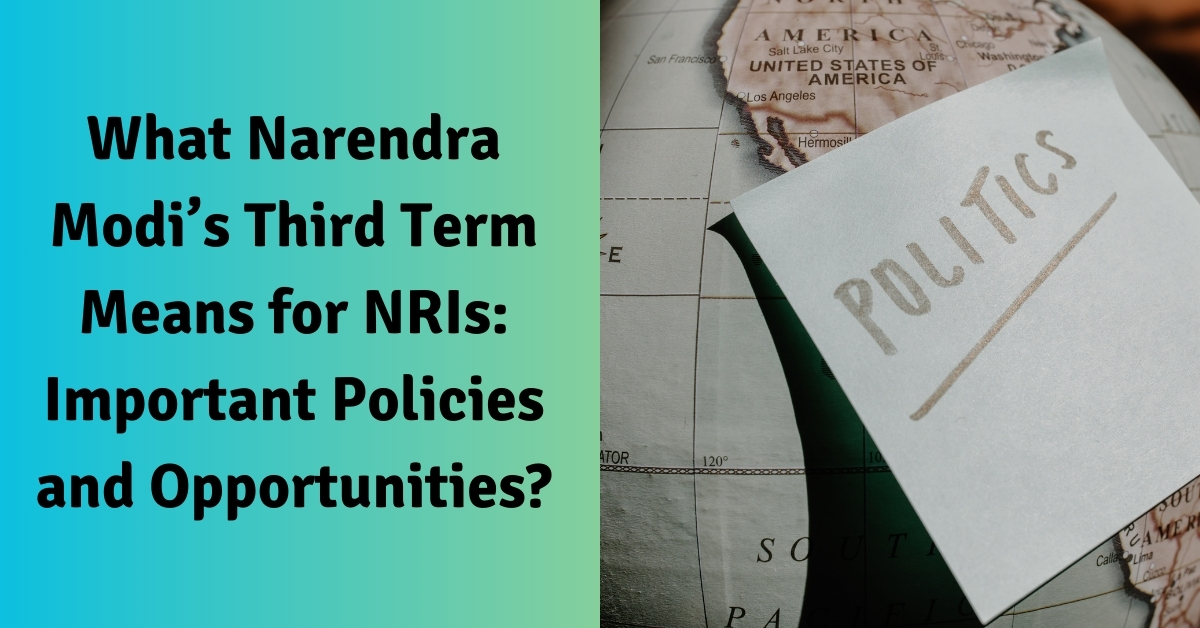What Narendra Modi’s Third Term Means for NRIs: Important Policies and Opportunities?
Narendra Modi’s third term as Prime Minister is expected to coincide with India’s ascension to become the world’s third-largest economy in 2027, as forecasted. This milestone is attributed to various policy initiatives, particularly in foreign affairs, which have expanded opportunities for Non-Resident Indians (NRIs) on the global stage. These policies have created diverse avenues for NRIs to engage, collaborate, and contribute to India’s development.
Let’s explore how initiatives in Modi’s third term, such as Viksit Bharat and Foreign Trade Agreements, may create new opportunities and benefits for NRIs.
Sustainable Development Prospects
The Viksit Bharat vision, focusing on inclusive and sustainable development across all segments of Indian society, is set to bring changes to the education system. This focus on youth development could create new opportunities for NRI students in India.
Free Trade Agreements and Economic Integration
Modi’s third term is expected to emphasize Free Trade Agreements with various countries, maintaining India’s commitment to global economic integration. This approach presents new opportunities for NRIs, particularly in enhancing trade and investment prospects both within India and internationally.
Strengthening India-US Relations
Throughout his tenure, PM Modi has played a crucial role in enhancing India’s international relations, particularly with the United States, home to a significant Indian diaspora. Modi’s June 2023 visit marked a significant milestone in India-US relations, establishing the “Initiative on Critical and Emerging Technology” charter. This agreement not only strengthened bilateral ties but also opened avenues for cooperation in areas like artificial intelligence and cybersecurity, creating investment opportunities for US-based NRIs in these sectors.
G7 Participation and Potential Expansion
PM Modi’s acceptance of the invitation to the G7 summit on June 13, 2024, from Italian Prime Minister Giorgia Meloni, is noteworthy. The G7 includes countries where a large Indian diaspora resides. India’s growing role as an economic driver of global growth through consumption, investment, and trade involves NRIs in this transformation. A potential expansion of G7 to G8, including India, could create unprecedented opportunities for NRIs beyond investment.
Indo-Pacific Cooperation: ASEAN and BIMSTEC
India’s focus on Indo-Pacific Cooperation promises benefits for NRIs in countries across the region, including ASEAN and BIMSTEC member states, as well as Japan, Korea, and Australia, home to over 1.5 million NRIs. Increased connectivity and cooperation with India and its maritime neighbors is expected to create opportunities for NRIs in trade, investment, and employment, particularly in technology, finance, and manufacturing sectors.
India-UAE Cultural Exchange
India’s engagement with the Middle East, particularly the UAE, is a key aspect of its foreign policy, boosting both economic ties and cultural recognition for NRIs. Modi’s visits to the UAE have emphasized NRI well-being and rights. The inauguration of Abu Dhabi’s first Hindu temple symbolizes the UAE’s inclusivity towards Indian culture. India’s strong regional position encourages NRIs to explore opportunities in trade, investment, and cultural exchange in the Middle East. Bilateral agreements like India’s UAE CEPA and initiatives such as I2U2 are expected to create further opportunities for NRIs.
Conclusion
Narendra Modi’s third term has opened up new global opportunities for NRIs, supported by India’s foreign policy which is rooted in national culture and interests. The increasing global interest in establishing various agreements with India, such as Free Trade Agreements, is expected to bring vast opportunities for NRIs. India’s diplomacy is positioned to deliver more benefits for its non-resident population.
FAQs’
Q1. How will Modi’s third term affect NRIs?
Ans- NRIs can expect new opportunities through policies on development, trade deals, and stronger global ties.
Q2. What is the Viksit Bharat vision, and how does it help NRI students?
Ans- The Viksit Bharat vision aims to improve India’s education system, offering more opportunities for NRI students to study and contribute to India.
Q3. How will Free Trade Agreements benefit NRIs?
Ans- Free Trade Agreements should enhance trade and investment prospects for NRIs, both in India and globally.
Q4. What does Modi’s US visit mean for NRIs?
Ans- The visit and new technology agreement open investment opportunities in tech and cybersecurity for NRIs in the US.
Q5. How might joining the G8 affect NRIs?
Ans- If India joins the G8, it could create more investment and trade opportunities for NRIs as India’s global influence grows.
Q6. What benefits will Indo-Pacific Cooperation bring to NRIs?
Ans- NRIs in the Indo-Pacific region might see more opportunities in trade, investment, and jobs in tech, finance, and manufacturing.
Q7. How does India’s engagement with the UAE affect NRIs?
Ans- Strong ties with the UAE offer NRIs chances in trade, investment, and cultural activities, supported by agreements like UAE CEPA and I2U2.
Q8. How do cultural exchanges fit into Modi’s foreign policy?
Ans- Cultural exchanges, like the Abu Dhabi temple opening, help NRIs by boosting cultural recognition and presence abroad.
Q9. How should NRIs prepare for changes under Modi’s third term?
Ans- NRIs should stay updated on new policies and explore new opportunities in trade, investment, and cultural exchanges.
Q10. What long-term benefits can NRIs expect from Modi’s policies?
Ans- Long-term benefits include better trade and investment opportunities, stronger cultural ties, and greater global engagement as India’s economic influence grows.




